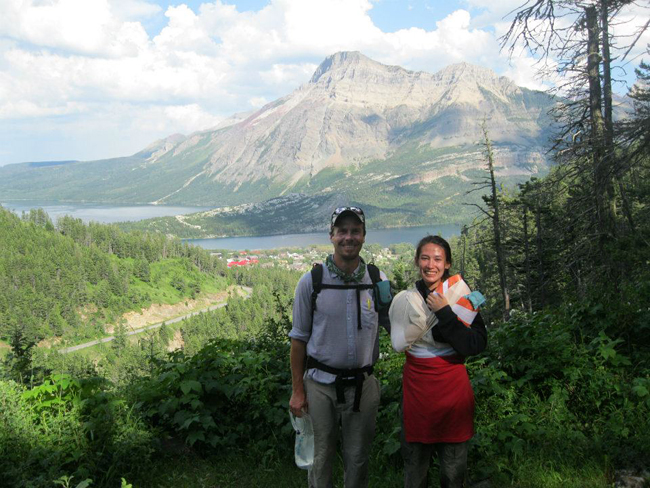My AGU Blogosphere neighbor Evelyn of Georneys fame is hosting this month’s Accretionary Wedge.
Her topic? “Field camp memories”…
I never attended a bona fide field camp myself, but I attended a lovely “regional field geology” course that my undergraduate alma mater, the College of William & Mary, put on each summer in the Colorado Plateau. Most of my field course experience has actually been in the past four summers, when Pete Berquist of Thomas Nelson Community College and I co-lead a two-week field course in the Rocky Mountains. For three years, we stuck to Montana and Wyoming. This year, of course, we ventured for the first time to the Canadian Rockies of Alberta and British Columbia.
We had an incident this year that seems worthy of telling you about… It’s a tale of being prepared, and things that can go wrong.
We were in Waterton Lakes National Park, hiking from Cameron Lake over Carthew Summit / Alderson Pass, and back down to the Waterton village (which they call a “townsite”). We had already had a thunderstorm with hail, and one student slipped and cut his hand a little bit. Nothing major. Then we were in the long slog at the end of the hike, where you’re back below treeline, and surrounded by lush greenery. My student Lucy crossed a stream, slipped on a rock, and fell down. When she came up, this is what her hand looked like:

In case my artistic skills don’t make it clear, her pinkie was bent at a 90° angle, within the plane of the hand. Lucy has a thin build and very delicate fingers. Her pinkie was like a soda straw that had been snapped. It was pretty gross looking, and it freaked her out. That freaked the surrounding students out. Everyone started screaming. I was up ahead, maybe 200 feet further down the trail. I sprinted back, motivated by the screaming. When I saw Lucy’s finger, I called Pete on the walkie-talkie radio. He was towards the “tail” of our group. Pete ran up to us, and we both broke out our first aid kits. Thanks to Wilderness First Aid training paid for by a Virginia Community College System “professional development” grant, we knew how to handle this. We assumed the finger was broken (it turned out only to have been dislocated), and cooled it with a shirt soaked in frigid creekwater. We gave Lucy a couple of ibuprofen. We gave a detailed description of the situation to three of our fastest hikers, and sent them ahead (with a walkie-talkie) to get an ambulance ready.
Then Pete and I immobilized Lucy’s finger. We really didn’t want it to move around while we were hiking her out, so we went overboard in immobilizing it, using two SAM splints and a bunch of Ace bandages and triangular bandages, gently pinning the injured hand to her opposite shoulder. Then we packed everything up and hiked out. Lucy was a champ. Once we had reassured her that they wouldn’t amputate her finger, she kept her spirits high and cracked jokes as we moved purposefully down the trail. I kept her topped off with water and small snacks, and we made good progress, though it was about an hour hike out. At one point, we rounded a bend, and the town came into view – we were close! She insisted we stop and pose for a picture:
From here, we were able to reach our advance runners with the radios, and learned that the ambulance was waiting down by Cameron Falls. A short while later, we reached them. Lucy got evaluated, Pete and I got teased for the giant wad of cushioning we had swaddled her hand in, and the rest of the students milled about, eager to help, but we sent them back to camp to make dinner. The emergency medical technicians suggested it was probably not broken, but only dislocated. Pete drove Lucy to the nearest town for a hospital visit, and the reset the finger and put a splint on it. They were back by 10pm, much to everyone’s relief.
I was really grateful that (a) I had training in what to do in this sort of circumstance, (b) that I had a full emergency kit, (c) that I had a calm partner in Pete, (d) that the weather was good, and (e) that Lucy handled it all so very well. It made me think about how serious an injury could be out in the wilds of these mountains, and how much more serious it gets just by virtue of being a given distance away from the road system.

